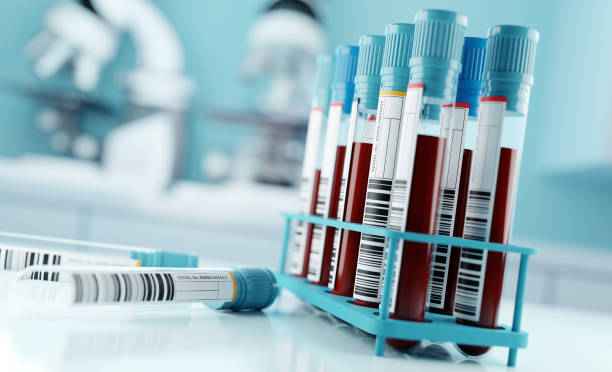


Hematology tests are essential for diagnosing and monitoring a wide range of health conditions related to the blood. At Biocheck Diagnostics And Polyclinic, we offer state-of-the-art hematology testing to help your healthcare provider assess and manage your health effectively.
Hematology Test
A hematology test involves the analysis of blood components—red blood cells, white blood cells, platelets, hemoglobin, and more. These tests provide vital information about your overall health and can help diagnose a variety of conditions, including anemia, infections, blood disorders, and more.
Hematology tests are performed using advanced technology to ensure accurate and reliable results, helping healthcare providers make informed decisions about your care.
Hematology Test

Preparation for hematology tests is usually simple and non-invasive. In most cases, no special preparation is required. However, depending on the test, your healthcare provider may advise you to:
Your doctor or our team will provide specific instructions based on the test you need.
WHY CHOOSE Biocheck Diagnostics And Polyclinic
Our laboratory is led by a highly qualified M.D. Pathologist, ensuring that every test is interpreted with expert knowledge.
We use advanced technology and automated systems to ensure that your hematology results are accurate, reliable, and fast.
Our lab is staffed with highly trained and experienced hematologists and medical technologists who interpret and analyze your results with precision.
We prioritize your privacy. All test results are confidential and shared only with you and your healthcare provider.
At the heart of everything we do is our commitment to the patient.
We understand that healthcare costs can be a concern, which is why we offer affordable pricing for all of our hematology tests.
What Biocheck Offers
This test helps in diagnosing conditions like anemia, infection, and various blood disorders.
A blood test that is used to measure the number of RBCs (Red Blood Cells), WBCs (White Blood Cells) and platelets.
It is the rate at which red blood cells descend in a standardized tube over one hour.
A blood test often used to check for anemia, when your body does not make enough healthy red blood cells.
Microscopic examination of blood films is the gold standard for malaria confirmation.
An immunochromatographic method based on detection of malarial antigens in peripheral blood.
A ferritin blood test can tell whether you are getting too much or too little iron.
This test checks bleeding level and clotting time to stop bleeding.
A blood test that measures the time it takes for plasma (liquid portion of blood) to clot.
Uses a blood sample to measure how long it takes for your blood to make a clot.
A blood test that measures D-dimer, a protein fragment made when a blood clot dissolves.
A blood test that measures the number of reticulocyte cells (immature red blood cells) in the blood.
KNOW ABOUT HEMATOLOGY
Hematological disorders can be classified into malignant and nonmalignant blood disorders. Nonmalignant blood disorders include hemoglobinopathies such as thalassemia and sickle-cell anemia, other types of anemias, and coagulopathies such as hemophilia. Hemoglobinopathies are genetic diseases and, apart from α- and β-thalassemia, include diseases caused by abnormal hemoglobin structure, manifesting in mild to severe anemia and multi-organ problems. Clotting disorders with genetic causes also include hemophilia and Von Willebrand disease, both of which are caused by low levels of clotting factors in the blood.
Malignant blood disorders include leukemia, lymphomas, and myelomas and can affect people of all ages. Malignant hematological disorders could be caused by various factors, including genetics, lifestyle, and environment. Polycythemia vera is a form of leukemia known as a myeloproliferative neoplasm, characterized by excessive production of red blood cells in the bone marrow, which causes blood to become more viscous and increases the risks of clots and heart attack. Myelofibrosis is another myeloproliferative form of leukemia where the bone marrow produces an excess of stem cells resulting in inflammation and scar tissue formation in the bone marrow. Malignant lymphomas, including Hodgkin's lymphoma, affect the lymphatic system and result in abnormal lymphocytes.
Myelodysplastic syndromes refer to a group of cancers where blood stem cells in the bone marrow fail to mature and form various mature blood cells. This results in refractory anemia, refractory cytopenia, chronic myelomonocytic leukemia, and various other cancers due to the insufficiency of red and white blood cells in the blood. Multiple myeloma is a form of cancer that results in excess plasma cells in the blood. The overcrowding of plasma cells in the blood causes a shortage of red blood cells, platelets, and white blood cells resulting in anemia, thrombocytopenia, and leukopenia, respectively. Multiple myeloma can also affect the osteoblasts and osteoclasts that keep bones healthy, causing bone degeneration and fractures.
Blood tests provide valuable information for diagnosing hematological and non-hematological diseases and disorders. A complete blood count (CBC) is one of the most common blood tests employed in disease diagnosis. The hematological parameters measured in a CBC include the number of white and red blood cells, platelet count, hematocrit red blood cell volume, hemoglobin concentration, differential white blood count, and various other red blood cell indices. Complete blood counts are used in diagnosing infections, anemia, blood-related cancers, and inflammatory diseases.
Platelet counts are informative about bleeding and clotting disorders. Clotting-related disorders such as hemophilia can also be monitored and diagnosed using coagulant tests such as prothrombin time and partial thromboplastin time. These tests can also be used to monitor anticoagulation or anticlotting therapies.
The bone marrow test is one of the rarer hematological tests and involves analyzing cells from the bone marrow to diagnose diseases such as multiple myelomas.
MAKE APPOINTMENTS